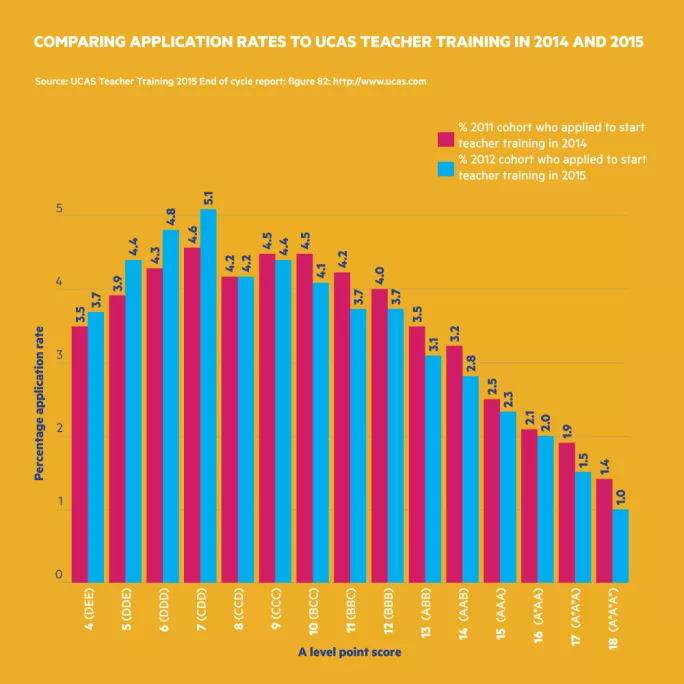
A-level stars least likely to apply for teaching

The country’s highest-achieving A-level students are the least likely to go on and apply to join the teaching profession, the latest official figures show.
The statistics from Ucas are a setback for the government, given its commitment to creating a more highly qualified teaching profession, and a “concern” for union leaders who say the brightest are being driven away from teaching.
Pupils who achieved an A-level point score of 18 - equivalent to three A* grades - have the lowest rate of applications to initial teacher-training courses, the figures reveal. And that rate has dropped by more than a quarter in the last year.
By contrast, those students who scored seven A-level points - equivalent to a C and two D grades - were the most likely to try for a career in teaching, with an application rate that was five times higher than the top achievers.

John Howson, a teacher recruitment expert and visiting professor at Oxford Brooks University, said that attracting those with the highest grades did matter.
“We need some of them, because those are the people who will have the best brains for development work, for research, to take education forward,” he said.
“These people have got a wide range of choices. Attracting them is a difficult problem to solve, but what we shouldn’t do is make it more difficult - when you impose a pay freeze, reduce salary increases - that is making the problem worse.”
The government has been trying to raise the bar for graduates entering teaching, by withdrawing funding for those who do not have a 2:2 degree or above, in most subjects, and expanding Teach First, which requires recruits to have a 2:1 or first-class degree.
But the Ucas figures suggest that these efforts are being hampered by the declining proportion of the highest achievers who want to become a teacher.
‘A great concern’
Kevin Courtney, general secretary of the NUT teaching union, said it was a concern that teaching was not attractive to high-fliers.
“Formal qualifications and grades are not the be-all and end-all of being a good teacher,” he said. “But it is true that people with high grades at A level may have more choices about their career and the fact there is a fall-off [as grades rise] coming into teaching should be of great concern to the government.
“We are concerned that teaching is becoming less highly regarded as a profession because the whole world sees the way politicians talk about teaching.”
The Ucas figures relate to students who took their A levels in 2012 and applied to teacher-training courses starting in 2015. They show that just 1 per cent of all pupils with three A* grades applied, down from 1.4 per cent the previous year.
That was in contrast to 5.1 per cent of pupils with a C and two D grades or equivalent, up from 4.6 per cent the previous year.
The differences in the application rates for teacher-training courses have resulted in similar disparities in the proportions of students who actually win places - and the gap is growing.
Just 0.85 per cent of pupils who achieved three A* A-level grades in 2012 began their teacher training in 2015, down from 0.94 per cent the previous year.
That compared with the 3.2 per cent of those who achieved CDD grades, or equivalent, who started teacher training in 2015 - up from 2.4 per cent the year before.
This gap has widened despite the fact that good A-level grades are necessary to be accepted on to some graduate teacher-training courses.
David Spendlove, head of initial teacher education at the University of Manchester, said that an A or B in either English literature or language was a requirement for anyone who wanted to be accepted on to his university’s PGCE course for English.
“Inevitably, we can be more discerning about A levels in certain subjects, due to the number of applicants,” he said. “But typically, we expect good A levels.”
However, Diane Swift, director of the Keele and North Staffordshire Primary SCITT, said that A-level grades were only one of the factors taken into consideration when recruiting people for the primary teacher-training course.
“The course we run here includes subject specialisms, so having a core subject knowledge is important, but it is too simplistic to equate subject knowledge and A-level grades. You need to look at the whole person and context,” she said.
A Department for Education spokesperson said: “We want to work with unions and the sector to raise the status of the profession so it takes its rightful place alongside other learned professions like medicine and law.
“There are record levels of trainees now holding a first-class degree and almost three-quarters of trainees hold a 2:1 or above - demonstrating that teaching quality is the highest it has been in a generation.”
You need a Tes subscription to read this article
Subscribe now to read this article and get other subscriber-only content:
- Unlimited access to all Tes magazine content
- Exclusive subscriber-only stories
- Award-winning email newsletters
- Unlimited access to all Tes magazine content
- Exclusive subscriber-only stories
- Award-winning email newsletters
You need a subscription to read this article
Subscribe now to read this article and get other subscriber-only content, including:
- Unlimited access to all Tes magazine content
- Exclusive subscriber-only stories
- Award-winning email newsletters
- Unlimited access to all Tes magazine content
- Exclusive subscriber-only stories
- Award-winning email newsletters